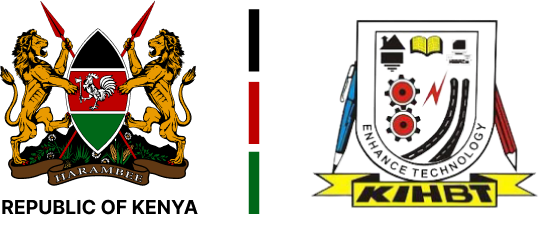Background
Kenya Institute of Highways and Building Technology (KIHBT), is a division in the State Department for Roads. The mandate of KIHBT is to provide training to ministerial staff for performance improvement, provide training to the wider infrastructure sector and capacity building for infrastructure development.
KIHBT was established as Road Authority Training School in 1948. The purpose was to carry out training for African supervisors, plant operators and mechanics.
By the time of independence (1963), the scope of the Institute had widened to serve the senior staff of the whole Ministry of Works and Local Authorities. The institute became part of a greatly enhanced training programme under the auspices of the Ministry of Works, Staff Training Division (STD), which was concerned with the Africanization of the services.
In 1969 the Staff Training Division (STD) transformed to Kenya Highways Training Centre and by 1972, the training of sub-professionals was controlled locally. Consequently, the Staff Training Department (STD) was set up in 1972 and opened to pre-service trainees. The training areas included Road Foremen, Road Overseers, Electrical Artisans, Hydraulic Assistants, Water Foremen, Inspectors and Survey Assistants. In 1982 the name changed to the Department of Staff Training (DST). In 1997 the training expanded to include in-service, pre-service and the public. Consequently, the department was renamed The Kenya Institute of Highways and Building Technology.
The Institute is now a major skills improvement training center, adequately staffed and with an annual trainee turn-over of more than six thousand (6,000). It serves the Ministry of Roads and Transport (MORT) as well as other ministries, parastatals, private and non-governmental organizations and international clientele.
KIHBT Ngong Campus constitutes two centers, Plant Training School (PTS) and Field Practical Unit (FPU). The names were derived from their original functions.
1979: Plant training centers were established at Kibiko Ngong with equipment donated from a construction site in Garissa. The objective was to transfer construction plant operation skills to Africans/Kenyans.
1982: The site was officially opened as Plant Training School (PTS) by then Transport and Communication Minister Henry Kosgei. Student capacity was 36.
At the same time, the existing Roads Construction and Maintenance Deport was handed over to Staff Training Department (STD) and renamed Field Practical Unit (FPU), to facilitate practical training to Roads Supervisors (Overseer Roads) who took theory training in Nairobi. The center continued with road construction and maintenance functions in the Ngong Division.
The two centers were managed by OiCs who reported to the HoD Roads in Nairobi. They evolved to offering on-the-job induction training to road supervisors, technicians, technologists, and engineers before they were posted to the District Works Officers for Deployment to their workstations. Other countries from Sub-Saharan Africa also sent supervisors for the training.
1984-86: The two centers jointly opened and constructed, to asphalt paved, the 12km Kibiko-Ngong-Kiserian Road. They separately, through training, opened and maintained roads in the Division and neighboring districts including other public and private projects.
1997: FPU and PTS merged to become the present KIHBT Ngong Campus. Artisan Programs (NITA programs) were transferred from KIHBT Nairobi to PTS. FPU facilities converted to residential units for KIHBT staff members.
2001: Road Building Certificate Course RBCC (today's CCRC) was started at PTS followed gradually by other craft certificate programs (KNEC examined). Total student population is 150, 60 being from POC.
2006: FPU was revived with the facilities reconverted to the present academic facilities and guest houses. The center has since attracted road management workshops, seminars and sponsored training from road authorities and development partners. KIHBT Ngong Campus received budgetary support from fuel levy and resumed roads maintenance through training of POC and other roads programs.
To date: Offering proficiency, artisans, craft certificates, POC and capacity-building programs with an annual output of 3500 trained participants.
The present-day Kisii Training Centre is one of the training campuses under the Kenya Institute of Highways and Building Technology (Ministry of Roads and Transport ).
Its origin dates back to 1978 when a training unit was established in Suneka-Kisii to train all personnel of supervisory staff of the then Rural Access Roads Program (RARP) under the then Ministry of Works. It was known as Rural Access Roads Training School.
To cope with the training demand for the Minor Roads Program (MRP), a more larger and permanent training centre was built 3 km from Kisii town Centre off Kisii – Kericho Road. It was then known as MRP Training School – Kisii. This is the present KIHBT - Kisii Training Centre
With the expanded application of labour-based technologies in improving and maintaining rural roads and those into which they fed, coupled with the employment creation potential of the programme towards the rural labour and locally available materials, the international community were enticed to apply similar methods in their own countries.


